Bed of Roses
Written by Jutta Goetze and Elizabeth Coleman
Produced by Southern Star Ruby Entertainment
For ABC TV (1)
IT'S NEVER TOO LATE TO BE WHAT YOU MIGHT HAVE BEEN.
George Eliot
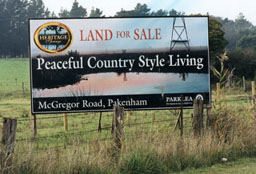
Louisa Franklin lived and went to school in Rainbow's End, back in.... well, a long time ago. It was where she met her husband Jack. They left Rainbow's End as newlyweds, but in her heart Louisa had left long before. She knew she was meant for better things. She was creative. She was going to make it as an artist - she just wasn't exactly sure what kind. While Jack's feet were firmly planted on the ground, Louisa's head was in the clouds. She flitted from one creative pursuit to another, always indulged and supported by Jack. What she lacked in talent (quite a lack), she made up for with her natural charm. Friends were many - but temporary. Staying power wasn't her thing; her focus was to have fun.
Twenty-nine years into Louisa and Jack's marriage, Louisa's life is still all about Louisa, she's failed to notice that her daughter Holly is distanced and disillusioned, that her son Shannon's life is skidding off the rails. And Jack? Well, Jack is a prominent businessman, able to afford Louisa's every whim, but he doesn't love her any more and is having an affair. Not that Louisa suspects anything; she's totally in the dark until Jack dies... on the job, as it were. Still, apart from a suitable period of mourning, Louisa's life could have gone on as it was.
But life has a way of never turning out as expected. It kicks you when you're down. Before his death, and more than likely contributing to it, Jack was on the verge of a merger and over-played his hand. The deal falls through and, because every joint asset was mortgaged - twice - the debts accrued are now the responsibility of the guarantor, Louisa. Who was never quite sure what being a guarantor entailed, and suddenly finds herself completely penniless.
Retreating into denial (her preferred tactic in difficult times), Louisa is ill equipped for the emotional fallout. Rainbow's End is the only place left for her to run to, and so she does, she runs home to mother. There she very quickly realises that the one thing she has left, a dilapidated weatherboard shack she inherited from her father, is her last hope. This piece of real estate carries with it the chance to start her life again - if she can get a good price for it. Unfortunately her mother, president of the Rainbow's End Heritage Committee, is mostly unsympathetic to her cause
Louisa is back where her life began. To lick her wounds, she tells herself, to regroup, work out a plan of attack. Spoiled and never wanting, she must now endure her poverty and its harsh realities. Louisa has to take the reins, become the breadwinner in her family. And, as it turns out, come to terms with all the things that led to her downfall, including the existence of the other woman: which means her life wasn't perfect, her marriage wasn't intact, and, as her daughter painfully points out, she was a major contributor to the situation they now finds themselves in.

As she re-builds her house, Louisa begins to rebuild her life. She reconstructs her sense of identity, her personal goals, and most importantly, her relationships with her family and friends. Louisa discovers her daughter Holly and through the new closeness she rediscovers herself. She starts to heal the wounds that exist between herself and her mother. She puts her son Shannon's life back on track, and forges strong links with the women of Rainbow's End. On a metaphysical level there's a ghost to contend with whose identity intrigues her; and there's the tantalizing legend of elusive gold, the fabled nugget called Mary Kelly's Tears. And let's not forget romance. Single once again, Louisa attracts the attention of a handsome neighbour, to experience all the awkwardness and uncertainty of sexual re-awakening. But insight comes in wisdom's wake, and Louisa may not need a man to define who she is. Finally, she discovers she is creative, and this love of photography is a way of representing the community that has been so vital in her rebirth.
As Louisa struggles with being financially destitute but more emotionally resolute, she learns to navigate the murky waters of small-town politics. In starting over, she becomes intrinsically entwined in the lives of the town's people, and builds firm, and lasting friendships, as well as renegotiating old relationships with the sexually sated Gemma Jansen, now married to weight-lifting poet Pat O'Reilly and running the local gym; the gentle animal liberationist Deb Mathieson, and Marg Braithwaite who possibly represents the person Louisa could become if she lets bitterness take its toll. These women are approaching the end of their youth and find strength in solidarity. They're united through Louisa.
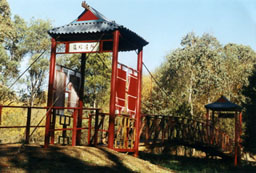
Yes, Louisa is well and truly over the rainbow when she first arrives at Rainbow's End. There is certainly no gold to be found. But she mines for that gold metaphorically, or it may just be she discovers that the pot of gold is not at the end of the rainbow after all, but is the journey, the rainbow itself. Louisa comes to recognise there IS life when you're heading towards 50 - she wouldn't be 30 again, even 40 again for quids. From mourning the loss of everything she knew, she comes to celebrate (and test out) all the possibilities that have opened up to her.
Louisa starts out the quintessential woman on the bones of her arse. But curious things happen when you reach that point. When you've lost everything, you soon realise you've got nothing else to lose. Once Louisa comes to understand that, she's empowered.
The writing of Bed of Roses
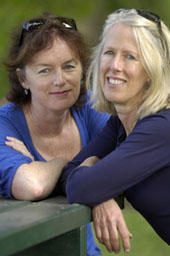
Bed of Roses was created and written by my creative partner and friend Elizabeth Coleman and I. Elizabeth has a similar screen-writing background to mine, but where I write books, Elizabeth has written plays. You might remember 'It's my party and I'll die if I want to', and 'Secret Bridesmaid's Business.'
Collaboration means you get the best of two people, and that is a strength. It's important that the two writers like one another. Trust one another. Equally important is the need for ego to be left at the door. It is hard working with someone else for a long period of time because you do begin to wonder - can I ever work alone again? Could I produce something of this calibre on my own? Self-doubt creeps in occasionally, I know I compare myself to Elizabeth, but being open and transparent is vital. As friends we laugh ourselves out of it. And having two people who are in synch, who have the same love and ambitions for the show and a similar working method, makes for a stronger and more cohesive series.
Both Elizabeth and I wanted to write a show about women our age. We were keen to showcase some of the great talent of our older actors; very few seem to have the opportunity to work as much as they should in this youth-besotted age, and time of reality TV.
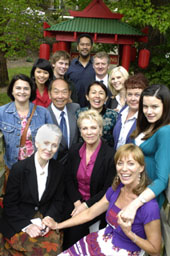
Ours is a story about the friendship between women, about mothers and daughters, about learning to be a better mother, a better human being. It is about three generations, a woman nearing 80, her daughter nearing 50, and her daughter who is 16. Of course it's about much more than that. In order to write, I draw from my life. Experiences sear the imagination. Real people and events inspire me. I find life challenging and tease it out, try to understand it, by writing about it.
I have turned fifty during the writing of this show. I have a friend who lives in Wandiligong. At 85 she is still the secretary of the Preservation Society there. This committee in concert with the council was responsible for building a small Chinese swing bridge over a creek, to commemorate the strong influence and participation of the Chinese in the area. As television is a visual medium this reality seized our imagination. We drew on fact to create fiction.
Rainbow's End, the town we created, is a small, fictional gold town. It is "every town". The show was filmed in Meeniyan, Gippsland. The name Rainbow's End is important to the story - there is something whimsical and hopeful in the thought that gold might be found at the end of our rainbow. But our town is situated at the end of a growth corridor; it is beleaguered by housing estates that threaten to overwhelm it. It is a town fighting for its identity and survival. We both think this is a recurring theme in Australia and that this theme will resonate.
Our creative process has been cured by our experience as writers on other people's shows. Here we had a chance to write towards the things that moved us, that were important to us. We began by discussing themes in general. Character arcs, journeys, character function. Themes. What did we want to say?
The first document we wrote was a Series Bible. This is a document that contains the plotting out of the entire show, characters and stylistic considerations.
Then came the outlines of individual episodes. Even though the network only required a submitted three pages - a story synopsis - we meticulously plotted the episodes as scene breakdowns. You have to know the entire story in detail, how it fits together, whether the plotting works, before you can tell it as a confident synopsis.
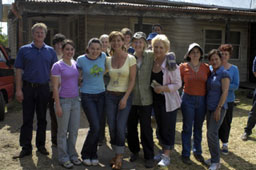
Each time we wrote a stage, (synopsis, outlines, first draft, second draft, third draft, polish), we swapped and edited and discussed. Then it was passed on to our producers and to the network. They in effect were the readers, and came back to us with comments, suggestions and further discussions. In the early stages, the fate of the show rested on their approval.
Elizabeth and I each took a handful of characters and developed them. Quite naturally we each gravitated towards certain characters and ran with them. As with everything we swapped, commented, added, edited.
Once the outlines had been given the go-ahead we began writing our episodes. Many drafts were written. Each episode has both our names on it, but to write, we commandeered individual episodes. Ownership of work is vital, even within collaboration.
The show's gestation period was well over six years, which is a long time for a TV series. Often, in that time, we were out of sight; we had slipped beneath the radar. The project is very much writer-driven, as opposed to having a story department - in our case we were the story department.
It has been an incredibly interesting, sometimes a fraught process. The waiting was particularly hard. I write this six days before the first episode goes to air. The most important relationship between a show and the characters in it is the relationship between that show and the audience. Will it resonate? We have such a beautiful cast, they have stepped into their roles like hands slipping into gloves, I can't help but hope and trust.

